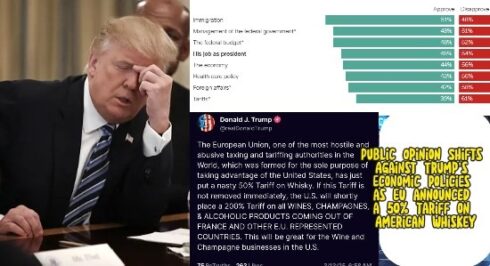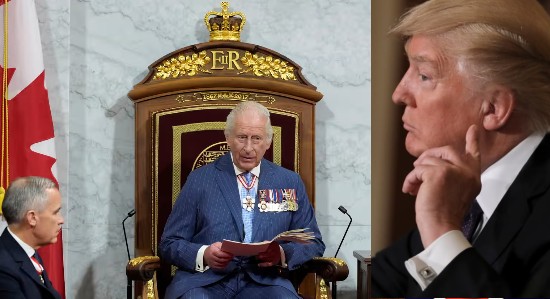Public Opinion Shifts | A recent CNN/SSRS poll reveals that 51% of Americans believe President Donald Trump’s economic policies have worsened the economy, while only 28% see improvements. The remaining 21% feel there has been no significant impact. This shift in public sentiment suggests growing dissatisfaction with the administration’s handling of economic matters.
The declining approval of Trump’s economic policies stems from increasing concerns over inflation, job market instability, and controversial trade decisions. Critics argue that his protectionist stance, characterized by aggressive tariffs and trade wars, has placed unnecessary strain on businesses and consumers. The latest data indicates that more Americans are now questioning whether Trump’s approach has done more harm than good.
Rising Trade Tensions: The Whiskey and Wine Tariff War
Public Opinion Shifts | Trade relations between the United States and the European Union (EU) have reached a boiling point. In response to U.S. tariffs on steel and aluminum, the EU has announced a 50% tariff on American whiskey, set to take effect in April 2025. This move has sparked outrage in U.S. trade circles, particularly within the beverage industry.
President Trump quickly retaliated, threatening a 200% tariff on European wines if the EU does not revoke its whiskey tariff. Taking to Truth Social, Trump declared, “If Europe’s tariffs are not removed immediately, the U.S. will shortly place 200% tariffs on all European wines.” His response has fueled concerns of a full-blown trade war, with both sides digging in their heels.
Public Opinion Shifts: Economic Repercussions and Market Reactions
The escalation of trade tariffs has already sent shockwaves through global markets. European stock indices have taken a hit, particularly affecting spirits producers such as Diageo, LVMH, and Pernod Ricard. American whiskey manufacturers fear a sharp decline in exports to the EU, similar to the downturn experienced in 2018 when similar tariffs were imposed.
Public Opinion Shifts | The Distilled Spirits Council of the United States has warned that retaliatory tariffs could stifle industry growth and hurt small distilleries that rely heavily on exports. Meanwhile, European wine exporters are bracing for potential losses, as U.S. tariffs could make their products significantly more expensive for American consumers.
Historical Context: A Repeat of Past Trade Disputes
Public Opinion Shifts | The current trade conflict echoes previous disputes that had severe economic repercussions. In June 2018, the EU imposed a 25% tariff on American whiskey in response to U.S. steel and aluminum tariffs. This led to a 20% drop in whiskey exports to Europe, dealing a major blow to American distilleries.
A temporary suspension of these tariffs in January 2022 allowed exports to recover. However, the latest tensions threaten to unravel these gains, demonstrating how fragile international trade relations remain under Trump’s policies. Trade analysts warn that escalating tit-for-tat tariffs could hurt both American and European businesses in the long run.
Public Opinion Shifts Amid Global Boycott of American Products
As trade tensions rise, there is growing international sentiment against American products. Europe has been at the forefront, with some consumer groups calling for a total boycott of U.S. goods. This movement is not limited to Europe; in Canada, Prime Minister Justin Trudeau has encouraged citizens to “buy Canadian” in response to U.S. tariffs on steel and aluminum.
Public Opinion Shifts | Surveys indicate that 98% of Canadians are now actively avoiding American-made products, and cross-border shopping has declined. In Denmark, public outrage over Trump’s remarks about Greenland has fueled online campaigns urging consumers to avoid U.S. brands. Similar sentiments are spreading across Australia and parts of Asia, as countries push for self-sufficiency amid growing trade hostilities.
The Impact on American Businesses and Tesla’s Decline
Public Opinion Shifts | Major American companies are already feeling the effects of shifting global attitudes. Tesla, once a rising star in Europe, has faced declining sales as consumers increasingly opt for European electric vehicle brands. CEO Elon Musk’s close ties with the Trump administration have further alienated potential buyers, adding to Tesla’s struggles in key international markets.
Beyond Tesla, other industries are also feeling the squeeze. The agricultural sector, particularly soybean farmers, has suffered from reduced exports due to retaliatory tariffs from China and the EU. Retailers relying on international supply chains are warning of price increases for American consumers, as trade barriers drive up costs.
A Warning Sign for Trump’s Economic Leadership
Public Opinion Shifts | The combination of declining public confidence, escalating trade wars, and growing international boycotts poses a serious challenge to Trump’s economic agenda. While the president continues to tout his “America First” trade policies, the reality suggests a different picture—one where both domestic and international players are growing increasingly wary of his leadership.
As the 2024 election cycle heats up, economic concerns are likely to be a major factor influencing voters. If current trends continue, Trump may face significant resistance from an electorate that is becoming more skeptical of his ability to deliver stable and prosperous economic policies.














